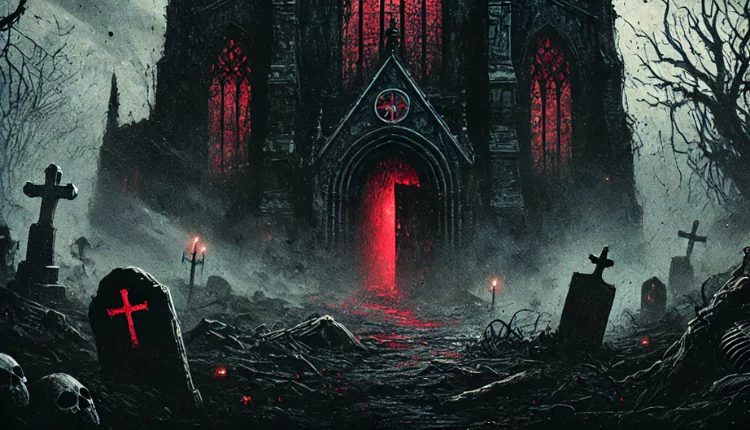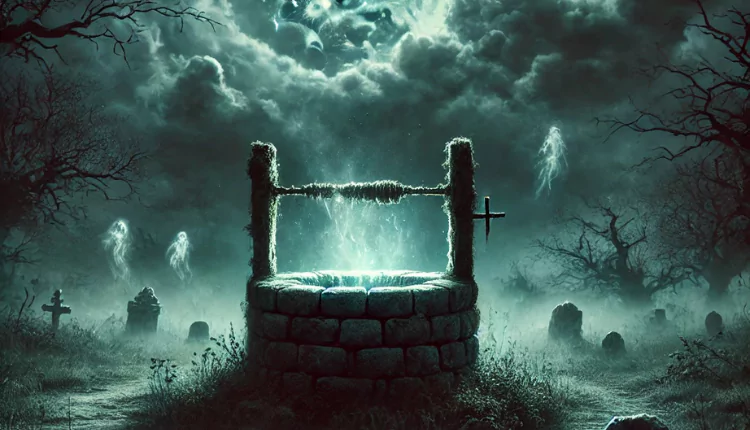The hills stretched vast and sombre beneath a leaden sky, a charcoal sketch with only a splash of colour from the yellowed grass that clawed through patches of frost. Even by day, the moor was a desolate place, abandoned to the wind and the rain, but it was on nights like these that it transformed, and a dense, dark, cold mist rolled in. It blurred the line separating the sky and the land; the moor seemed to go on forever. Hence, most of the villagers avoided it after dark, especially when the fog pressed in thick smoke, obscuring even the silver flicker of stars.
But Jason wasn’t “most of the villagers.”
He’d heard the story for years – the story about something strange on the hills; a faint or bright light appearing randomly near the slope towards the lake; or the shadowed figure of a man walking the moor. The tale had been passed down by his grandfather, who’d heard it from his own father and him from his father. They called him “The Lantern-Man,” a spectral figure who walked the moor carrying an old-fashioned lantern and whose face was seen by none, for he hid it beneath a hood.
“A mere story,” Jason’s mother would say dismissively whenever his grandfather tried to bring it up. “You’d do better to teach him how to mend the fences than fill his head with that nonsense!”
However, tonight was different: Jason was alone. And now that he was seventeen and “far too old to fear a story,” as he though, the idea of the Lantern-Man filled him not with dread but with something else: an air of excitement and a desire to test himself against the lingering dark. Thus, he pulled on his long coat, and with a scarf wrapped nice and warm around his neck, he silently slipped out of the house.
As he climbed the slope towards the edge of the moor, where the odd sightings occurred, he felt the cold bite his skin; for a moment, when he heard his mother’s warning in his head, he hesitated, but soon shook off the feeling: “Nothing’s gonna happen,” he said to himself, trying to break the creeping silence around him. He told himself this again as he took his first steps onto the frozen ground as his boots started crunching softly.
That was when the fog closed in and started thickening – getting denser and denser as he walked further from the village lights. Soon, all he could see was a few feet in any direction he faced, nothing but grey over his head and rough ground underfoot. But with a mental map of the path he was walking, he kept moving, trying to keep his spirits high and his body warm. After what felt like an hour, though it might have been less, he realized he was lost; the cold felt sharper, and it sank into his skin like tiny needles.
He stopped for a moment, pondered, and right when he was about to turn back, admitting defeat, he saw it.
It was a small, flickering yellow light – faint yet unmistakable, and it was just ahead and slightly to his right. Jason froze; his feet couldn’t lift off the ground; his heart wouldn’t stop pounding inside his chest. Where logic told him it could be anything from a stray traveler to a shepherd or a distant farmhouse, his heart screamed echoes of warning, his grandfather’s voice to never pursue the story, his mother’s advice of focusing on something productive instead of mere tales. “Turn back, run home,” was all he could say to himself.
Still, as if being attracted by an unknown force, he took a step forward, then another, moving toward the light.
As he drew closer, he saw that it was a lantern, exactly the kind his grandfather used to have: an old, brass-framed one with a soft, wavering flame inside; the figure holding it was shadowed, wearing a long dark cloak like Jason’s, a hood covering the face, and the mysterious mist clinging to him like a shroud.
“Hello?” Jason called, his trembling voice sounding thin in the fog.
But the figure didn’t respond; instead, he turned and started walking with steps silent despite the frozen ground below. Jason, again, felt a strange compulsion to follow as if the figure’s lantern were a magnet pulling him forward: he quickened his pace to match the figure’s steps though he never quite seemed to close the distance between them.
“Wait!” he called again, but his words were swallowed by the mist and barely made a sound.
The figure kept walking and kept leading him deeper and deeper into the moor, where the frost lay thicker, and the fog grew dense as wool. The air was so dry Jason’s breath began to hitch in his throat; the atmosphere was so silent that he could hear his heart hammer; he felt an icy prickling up his spine, a whisper of dread that he was continuously trying to ignore. And he was about to call out again when the figure stopped abruptly.
It lifted the lantern, which cast a pale light on the ground between the two, and Jason saw something shining there – not something pretty, though. It was something that made his skin crawl: a tangle of chains, worn and rusted, half-buried in the frost.
And then he heard it: a faint, rhythmic creaking, the kind he’d only ever heard on the moor in the dead of winter. It was the sound of ice shifting and groaning under an unseen weight.
“Go back,” a voice as dry as crumbling autumn leaves whispered. No, it didn’t come from the figure but from somewhere close to Jason’s ear, but no one was there. He jerked back – his instincts finally overpowering his curiosity.
Nonetheless, when he turned, he found himself facing nothing but fog, for the path he’d come by was gone. And it was replaced by an endless, shifting grey; he spun back around, and this time, the figure was gone too, the lantern’s light extinguished. In its place, the chains lay sprawled in the frost, glinting with a strange, dark lustre.
He began to walk, then to run, but each step only seemed to drag him deeper into the moor because he felt the fog getting thicker with each stride. Just when he though it couldn’t get any denser, it did, and soon, he felt like he were moving through water. Soon, panic gripped him; his breaths came fast; he tried to remember the way back, but everything looked the same: a twisted, frost-bitten landscape under a dark, endless sky.
And then he heard it again: the creak of ice shifting. It was closer this time.
Jason looked down and realized he was standing on the edge of the frozen lake, the surface of which was but a thin crust of ice flecked with dark patches where the water showed through. He could see the faint outlines beneath the ice, lit by the moonlight: shapes that seemed almost human, blurred and distorted.
A scream clawed up his throat, but he could not find a voice to force them out; he staggered back, his foot slipping on the frost, and suddenly he was on the ground, his hand brushing something cold and metallic.
The chain…
It coiled around his wrist; it was as cold as death, and its grip tightening like a vice. Jason gasped and struggled to free himself, but the chain, like quicksand, kept tugging at him tighter the more he struggled. It started dragging him toward the lake’s edge. Jason could see the fog swirl, revealing for a moment the cloaked figure standing on the lake; his lantern, however, was extinguished.
“Let go of me!” Jason shouted, surprised at having found his voice, but the only answer was that same, dry whisper: “Too late…”
With one final, desperate pull with all the energy he could find in himself, he tore himself free, and the chain clattered to the ground. He stumbled back, his breath ragged, and he ran, not looking back, pounding his feet across the frozen ground. He ran and ran in one direction until he saw, dimly through the mist, the glow of the village lights.
But he didn’t stop until he was safely inside his home. His heart was as if it would jump out of his chest.
He never told anyone what he’d seen, but he never returned to the moor after dark again. Still, sometimes, on misty nights, he’d glance out his window, half-expecting to see that lantern flickering at the edge of the village.
And, sometimes, he did.
Searching for chilling tales that will captivate both teenagers and horror fans?
Step into the spooky world of Scary Stories on Storyious and read the ultimate compilation of spine-tingling horror stories that will give you a dose of thrill and captivate you with narratives about paranormal encounters, haunted houses, psychological horrors, and dark folklore. Each of our eerie tales is sure to spark your imagination and raise your heart rate. So, if you are looking for a creepy campfire story to tell to your friends or a disturbing read for yourself in the stillness of night, these stories are guaranteed to make you confront fear like you would never have done before.







Comments